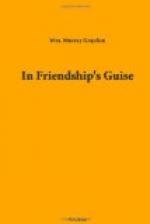“You my uncle, Sir Lucius?” he asked, hoarsely.
“Yes, your uncle!”
“By Jove, another mystery!” gasped Jimmie. “It knocks me breathless! I don’t know what to make of it—it beats the novels that wind up with the discovery of the lost heir. At all events, Jack, you seem to be in luck. I’m awfully glad!”
“I—I’m afraid I don’t quite understand,” said Jack. “I never suspected anything of the sort, though I remember that my mother rarely spoke of her early life.”
“That was her secret,” replied Sir Lucius, “and she intended that it should be revealed to you after her death. Read these; they will tell you all!”
Sir Lucius produced three papers from his pocket. Jack took them, and he uttered an exclamation of astonishment as he saw that one was a certificate of his mother’s marriage, and another one of his own birth. The third paper was a letter of a dozen closely written sheets, in the dead hand that was so familiar to him. As he read on, his face showed various emotions.
“My poor mother, how she suffered!” he said when he had finished the letter. “It is a strange story, Sir Lucius. So my mother was your sister, and Victor Nevill was the son of another sister, which makes him my cousin. My mother knew all these things, and yet she never told me!”
“She had the family pride,” Sir Lucius answered, with a sigh. “As for Victor Nevill, I regret that the blood of the Chesneys runs in his veins. But he is no longer any kin of mine—I disown him and cast him out. The letter does not speak so harshly of me as I deserve. Your mother, Mary, was my youngest and favorite sister—I loved her the more because my wife had died childless soon after my marriage. I got a clever young artist, Ralph Clare, down to Priory Court to paint Mary’s portrait, little foreseeing what would happen. She fell in love with him, and fled to become his wife. It was a blow to my family pride, and my anger was stronger than my grief. I vowed that I would never forgive her, and when she wrote to me—once a short time after her flight, and again ten years later—I returned her letters unopened. Her elder sister was as obdurate as myself, and refused to have anything to do with her. After the death of Elizabeth—that was Victor Nevill’s mother—I began to feel that I had been too harsh with Mary. My remorse grew, giving me no rest, until recently I determined to find her. But I might never have succeeded had not mere chance helped me. I was struck by your resemblance to Mary when I first met you in Lamb and Drummond’s shop—”
He paused for a moment, struggling with emotion.
“My boy, believe that I am truly repentant,” he added. “I have no kith or kin left but you—you alone can fill the empty void in my heart. You must reign some day at Priory Court. Will you forgive me, as your mother did at the last?”
For an instant Jack hesitated. He remembered the sad story he had just read—the story of his father’s illness and death, his mother’s subsequent privations, and the grief caused by her brother’s cruel conduct, which continued to cloud her life after a distant relative bequeathed to her a comfortable legacy. Then he recalled the last words of the letter, and his face softened.




